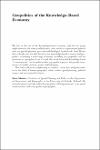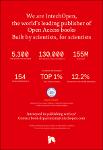Search
Author
- Gittell, Ross (2)
- Köhn, Doris (2)
- Magnusson, Matt (2)
- Merenda, Michael (2)
- next >
Subject
- kinh tế (16)
- Economics (9)
- Management science (7)
- Development Economics (5)
- next >
Date issued
Has File(s)
- true (47)
Search Results
Sustainable development is the 21st Century's wicked problem. After 40 years into this agenda have reversed only few unsustainable trends we hear the call for aparadigm shift, transformation, radical change or system innovations in order to finally change course. But what does this actually mean? And how do we put it into practice? This book describes the path ahead. It combines system transformation research with political economy and change leadership insights when discussing the need for a great mindshift in how human wellbeing, economic prosperity and healthy ecosystems are understood if the Great Transformations ahead are to lead to more sustainability. It shows that history is made by purposefully acting humans and introducestransformative literacy as a key skill in leading th... |
We live in the era of the knowledge-based economy, and this has major implications for the ways in which states, cities and even supranational political units are spatially planned, governed and developed. In this book, Sami Moisio delves deeply into the links between the knowledge-based economy and geopolitics, examining a wide range of themes, including city geopolitics and the university as a geopolitical site. This book will prove enlightening to students, researchers and policymakers in the fields of human geography, urban studies, spatial planning, political science, and international relations. |
Made in Africa presents the findings of original field research into the design, practice, and varied outcomes of industrial policy in different sectors in Ethiopia. The book explores how and why the outcomes of industrial policy are shaped by particular factors in different industries. The findings are discussed against the backdrop of ‘industrial policy’, which has recently found renewed favour among economists and international organizations, and of the history of thought about and practice in industrialization. The book seeks to learn from the failures and successes in the cement, leather and leather products, and floriculture sectors, all of them functioning under the umbrella of a single industrial strategy. Moreover, it argues that success lies in the interactions among polic... |
Part I: A power and systems approach: Systems thinking changes everything, Power lies at the heart of change, Shifts in social norms often underpin change. Part II: Institutions and the importance of history: How states evolve, The machinery of law, Accountability, political parties, and the media, How the international system shapes change, Transnational corporations as drivers and targets of change. Part III: What activists can (and can’t) do: Citizen activism and civil society, Leaders and leadership, The power of advocacy. Part IV: Pulling it all together: A power and systems approach to making change happen. |
This open access book asks why and how some of the developing countries have “emerged” under a set of similar global conditions, what led individual countries to choose the particular paths that led to their “emergence,” and what challenges confront them. If we are to understand the nature of major risks and uncertainties in the world, we must look squarely at the political and economic dynamics of emerging states, such as China, India, Brazil, Russia, and ASEAN countries. Their rapid economic development has changed the distribution of wealth and power in the world. Yet many of them have middle income status. To global governance issues, they tend to adopt approaches that differ from those of advanced industrialized democracies. At home, rapid economic growth and social changes put... |
A response is needed to the numerous issues spurred by the expansion of the gig economy, where flexible patterns of employment prevail in contrast to permanent jobs. In this context of the exponential growth of the digital economy and underlying business models the largest nationwide study of its kind into the impact of the working conditions in the UK music industry 'Can Music Make You Sick?' has been conducted by MusicTank/University of Westminster. This research suggests the need to consider the future of work not only from an economic or employment law perspective but from a mental health one too. What are the psychological implications of precarious work and how are factors such as financial instability, the feedback economy and personal relationships reflected in mental health... |
In this chapter, the life cycle assessment was presented as a tool to implement sustainable development in the bioeconomy and circular economy. Bulky waste includes large items such as furniture, doors, flooring and mattresses. The management of bulky waste is a serious problem for European countries. The URBANREC project proposed a solution to this problem through the use of new technologies for the bulky waste processing. The aim of the URBANREC project is to implement an eco-innovative, integrated system of bulky waste management and demonstrate its effectiveness in various regions of Europe. The project has received funding from the European Union. In this chapter, the LCA environmental analysis was performed for the technology of grinding bulky waste using a water jet by the Ec... |
This open access book explores the most recent trends in the EU in terms of development, progress, and performance. Ten years after the 2008 economic crisis, and amidst a digital revolution that is intensifying the development race, the European Union, and especially Central and Eastern Europe, are ardently searching for their development priorities. Against this background, by relying on a cross-national perspective, the authors reflect upon the developmental challenges of the moment, such as sustainable development, reducing inequality, ensuring social cohesion, and driving the digital revolution. They particularly focus on the relation between the less-developed Eastern part of the EU and its more developed Western counterpart, and discuss the consequences of this development gap... |
The Shadow Economy: Challenges to Economic and Social Policy, The Concept of the Survey of Businesses and Entrepreneurs Operating Informally, Causes of the Shadow Economy, What Is the Extent of the Shadow Economy in Serbia? Shadow Economy in the Business and Entrepreneurial Sectors, Effects of Formalisation of the Shadow Economy, Analysis of the Administrative Capacity of the Institutions in Charge of Overseeing the Operations of Business Entities, Main Findings and Recommendations, Executive Summary. |
At present, how to develop industries is a burning issue in Africa, where population growth remains high and economic development has thus far failed to provide sufficient jobs for many, especially young people and women. The creation of productive jobs through industrial development ought to be a central issue in steering economic activity across the continent. The authors of this book, consisting of two development economists and five practitioners, argue that the adoption of Kaizen management practices, which originated in Japan and have become widely used by manufacturers in advanced and emerging economies, is decisively the most effective first step for industrial development in Africa. This open access book discusses what Kaizen management is, why it is applicable to Africa, a... |










